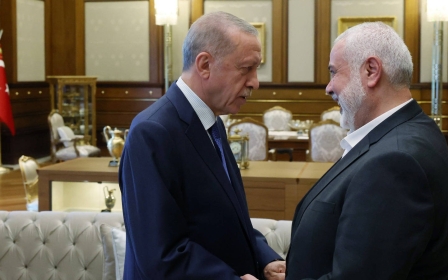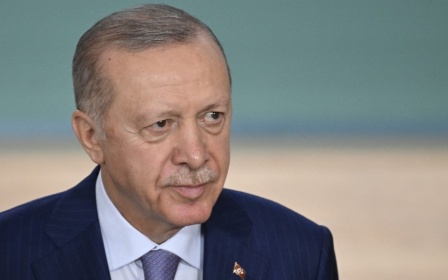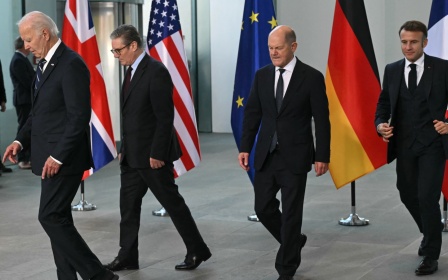What's behind the claims Hamas is moving to Turkey?

For days, various media outlets have been briefed the same line by Israeli sources: Qatar asked Hamas to leave Doha with Gaza ceasefire talks going nowhere.
Now come new reports saying the Palestinian movement's leaders were moving to Turkey instead.
Qatar itself has formally denied that Hamas' political bureau in Doha is closing, though that hasn't stopped a narrative building that Turkey will become Hamas's main base of operations outside Palestine.
Officials in Ankara say they find the timing confusing and suspicious.
Turkish foreign ministry officials have repeatedly underlined this week that Hamas members have been in Turkey since Israel sent them there as part of the 2011 Gilad Shalit prisoner-exchange deal.
New MEE newsletter: Jerusalem Dispatch
Sign up to get the latest insights and analysis on Israel-Palestine, alongside Turkey Unpacked and other MEE newsletters
They also note that Hamas officials living elsewhere commonly visit Turkey to hold meetings, and sometimes stay for extended periods.
Meanwhile, Hamas sources told Palestinian media on Monday that their offices were going nowhere.
Bilgehan Ozturk, a regional expert at the Ankara-based think tank SETA, believes it is no coincidence that these Israeli reports coincide with the re-election of Donald Trump and the announcement of his highly pro-Israel cabinet.
Ozturk suggested to Middle East Eye that the timing of these reports could be an attempt to counterbalance the positive rapport between Turkish President Recep Tayyip Erdogan and Trump by portraying Turkey as the main sponsor of Hamas.
Move to increase pressure on Hamas
Several sources familiar with the situation said Israel may be trying to get the Biden administration to step up pressure on Hamas and prepare the ground for Trump to take an even more aggressive stance against the Palestinian movement.
For years, Washington has turned a blind eye to Hamas' presence in Turkey.
But since the 7 October Hamas-led attack on Israel, the US has sanctioned some individuals and companies in Turkey over their alleged ties to the group.
A State Department spokesperson on Monday made it clear that Washington would no longer tolerate Hamas' presence Turkey, demanding its members there be deportated to stand trial in the United States.
Turkey, in response, may be seeking ways to shield itself from such pressure.
This week, Israeli news outlet Walla reported that Ronen Bar, head of Israel's domestic intelligence agency Shin Bet, secretly travelled to Turkey on Saturday to meet with Turkish intelligence chief Ibrahim Kalin.
The two reportedly discussed “the possibility of Turkish mediation”. However, neither Turkish intelligence nor Shin Bet has commented on the matter, and the report did not specify the source of the information.
A source in Ankara expressed doubts that Turkey would take over Qatar’s role in mediating between Israel and Hamas, citing the poor relationship between Israeli Prime Minister Benjamin Netanyahu and Erdogan.
The source did suggest, however, that by leaking details of the meeting between Turkish and Israeli intelligence at a time of heightened scrutiny over Hamas’s presence in Turkey, Ankara may be emphasising its unique position: it can simultaneously host Hamas leaders and Israeli intelligence officials within the same week.
A separate source familiar with the issue speculated that if Hamas leaders were to leave Qatar for places like Iran or Lebanon, it could present an opportunity for Israel to assassinate them, as it did with Saleh al-Arouri in Lebanon in June and Ismail Haniyeh in Iran in July.
However, the sources noted that Turkey complicates the situation, as it is a member of Nato, and Israel has historically refrained from conducting assassinations or military operations targeting Hamas leaders on Turkish soil.
Middle East Eye delivers independent and unrivalled coverage and analysis of the Middle East, North Africa and beyond. To learn more about republishing this content and the associated fees, please fill out this form. More about MEE can be found here.





